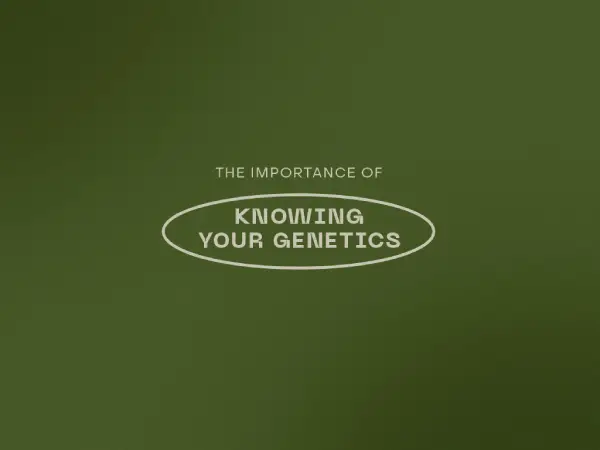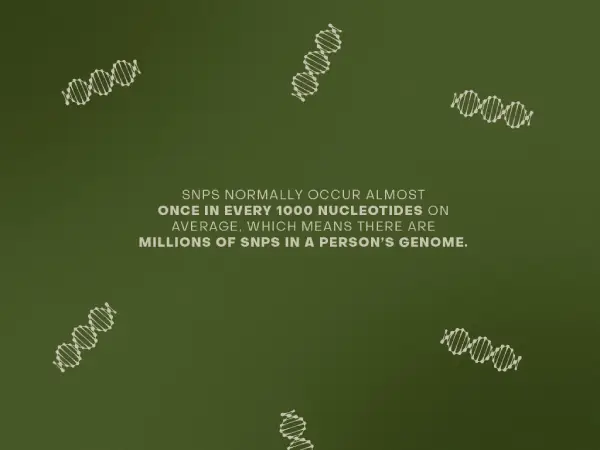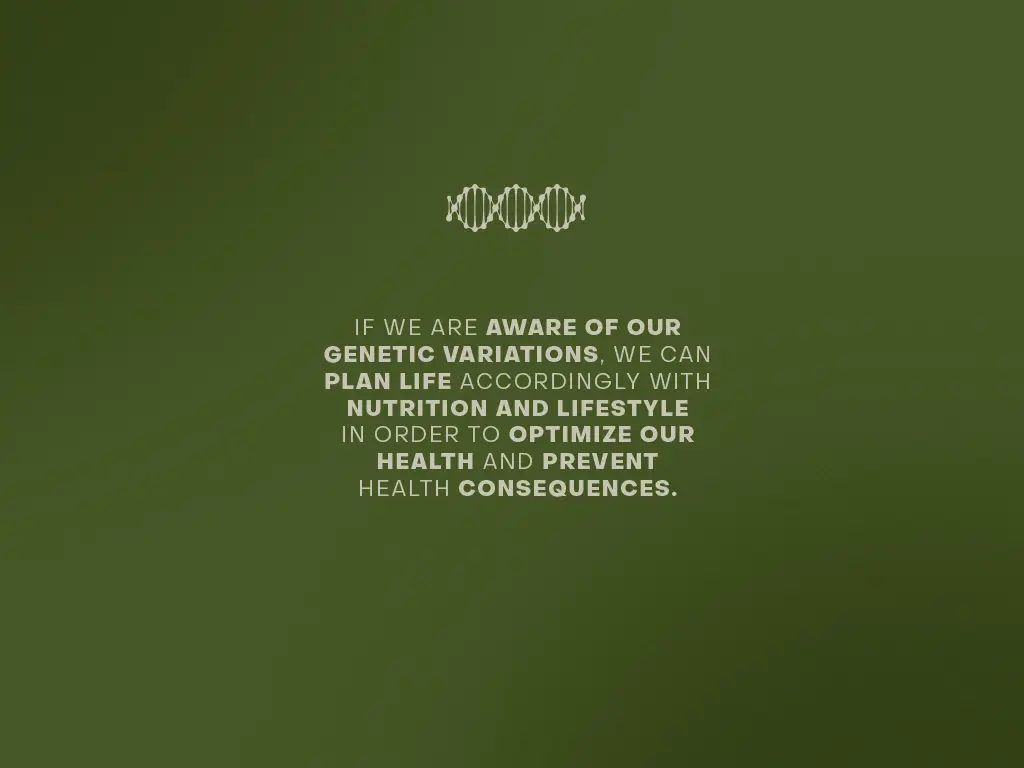Blog
The Importance of Knowing your Genetics

Genetics, genes, and the genome
Genetics is the study of genes and heredity – genes are segments of DNA and heredity is the passing of genes from parent to child. DNA is a helical structure that contains sequences of base pairs (building blocks – adenine, thymine, guanine, cytosine) that provide the instructions for building molecules (mostly proteins) that ultimately makeup your body and keep it functioning. Our genes are the instruction manual for making the body work and they determine our physical traits such as what we look like and what health conditions we are susceptible to. It is estimated that humans have about 20,000 genes. The genome is the entirety of our genetic information and it can be found in nearly every cell in the body.
Single nucleotide polymorphisms (SNPs, “snips”)
Polymorphisms are variations in a particular DNA sequence. Single nucleotide polymorphisms are the most common type of genetic variation among humans and represent a variation in a single base pair of a DNA sequence. SNPs normally occur almost once in every 1000 nucleotides on average, which means there are millions of SNPs in a person’s genome. A variant must be found in at least 1 percent of the population for it to be classified as a SNP; there have been over 600 million SNPs found in populations around the world. Thankfully, most SNPs have no effect on health or development. However, they can help predict a person’s risk of nutritional deficiencies and certain diseases, response to certain drugs, and capacity to metabolize and detoxify many substances.
SNPs connection to health and disease
Genetic information can be used as a guide to identify root causes, treat disorders, and optimize health. Genetic testing has become a popular approach to weight loss, longevity, fertility, performance, and general health. This is because genetic testing gives you a peak into the blueprint that makes you, you! It can teach you a lot about yourself and your body and provide explanations about why you are the way you are physically, mentally, and even emotionally.
What genes can affect your health?
Here is a list of genes that are commonly affected by variations and how each of them can affect health:
MTHFR (methylenetetrahydrofolate reductase), MTR, MTRR – can tell us about our ability to keep homocysteine levels in check and what form of B vitamins works best for the body
VDR (vitamin D receptor) – can tell us about our ability to use vitamin D and if we need to supplement vitamin D in higher doses than normal to prevent deficiency
CYP (cytochrome 450) – can tell us about our ability to detoxify substances such as medications, toxins, nutrients, and hormones
GST (glutathione S-transferase) and GPX (glutathione peroxidase) – can tell us about our ability to fight oxidative stress and maintain adequate glutathione levels (the body’s master antioxidant)
MAO-A (monoamine oxidase A) and COMT (catechol-O-methyltransferase) – can tell us about our ability to breakdown catecholamines like epi- and norepi-nephrine, dopamine, serotonin (high or low levels of catecholamines can alter several behaviors)
DAO (diamine oxidase) – can tell us our ability to breakdown histamine (the “allergy” chemical)
HLA-DQ2 and HLADQ8 (human leukocyte antigens) – can tell us about our risk for developing celiac disease
BRCA 1 and 2 (breast cancer gene) – can tell us about our risk for developing breast cancer
APOE (apolipoprotein E) – can tell us about our risk for developing Alzheimer’s disease
NOS (nitric oxide synthase) – can tell us about our risk for developing heart disease
Note: this is an oversimplified description of each gene, which have far more functions than what is listed, many of which are overlapping.
Biochemical individuality & genetic testing
We all have what’s referred to as biochemical individuality – how we are unique on a biochemical level. Understanding this allows us to design the most individualized and effective health plan. If we are aware of our genetic variations, we can plan life accordingly with nutrition and lifestyle in order to optimize our health and prevent health consequences. For example, it can inform us of which nutrients we need to eat more of and what types of exercise we need to perform more of. It’s important to remember that genetics may load the gun but it’s the environment that pulls the trigger. In other words, your genetics are not your destiny and being familiar with them gives you the power to direct your future.
There are many depths to genetics and genetic testing, this blog only focuses on one piece of the giant puzzle. If you’re interested in genetic testing and an individualized health plan based on your results – set up an appointment with one of our naturopathic doctors at LIVV!
Written by Jordan Valdez, RDN
References
https://www.nigms.nih.gov/education/fact-sheets/Pages/genetics.aspx
https://holisticprimarycare.net/topics/holistech/snp-secrets-five-genes-every-clinician-should-know/
https://www.drhagmeyer.com/genetic-testing-mthfr-mtr-mtrr-comt-ahcy/
Volavka J, Bilder R, Nolan K. Catecholamines and aggression: the role of COMT and MAO polymorphisms. Ann N Y Acad Sci. 2004;1036:393-398. doi:10.1196/annals.1330.023
Levinsson A, Olin AC, Björck L, Rosengren A, Nyberg F. Nitric oxide synthase (NOS) single nucleotide polymorphisms are associated with coronary heart disease and hypertension in the INTERGENE study. Nitric Oxide. 2014;39:1-7. doi:10.1016/j.niox.2014.03.164
Xu GP, Zhao Q, Wang D, et al. The association between BRCA1 gene polymorphism and cancer risk: a meta-analysis. Oncotarget. 2018;9(9):8681-8694. Published 2018 Jan 6. doi:10.18632/oncotarget.24064
Dubois PC, Trynka G, Franke L, et al. Multiple common variants for celiac disease influencing immune gene expression [published correction appears in Nat Genet.2010 May;42(5):465]. Nat Genet. 2010;42(4):295-302. doi:10.1038/ng.543
Maintz L, Yu CF, Rodríguez E, et al. Association of single nucleotide polymorphisms in the diamine oxidase gene with diamine oxidase serum activities. Allergy. 2011;66(7):893-902. doi:10.1111/j.1398-9995.2011.02548.x
Ahmad T, Valentovic MA, Rankin GO. Effects of cytochrome P450 single nucleotide polymorphisms on methadone metabolism and pharmacodynamics. Biochem Pharmacol. 2018;153:196-204. doi:10.1016/j.bcp.2018.02.020


